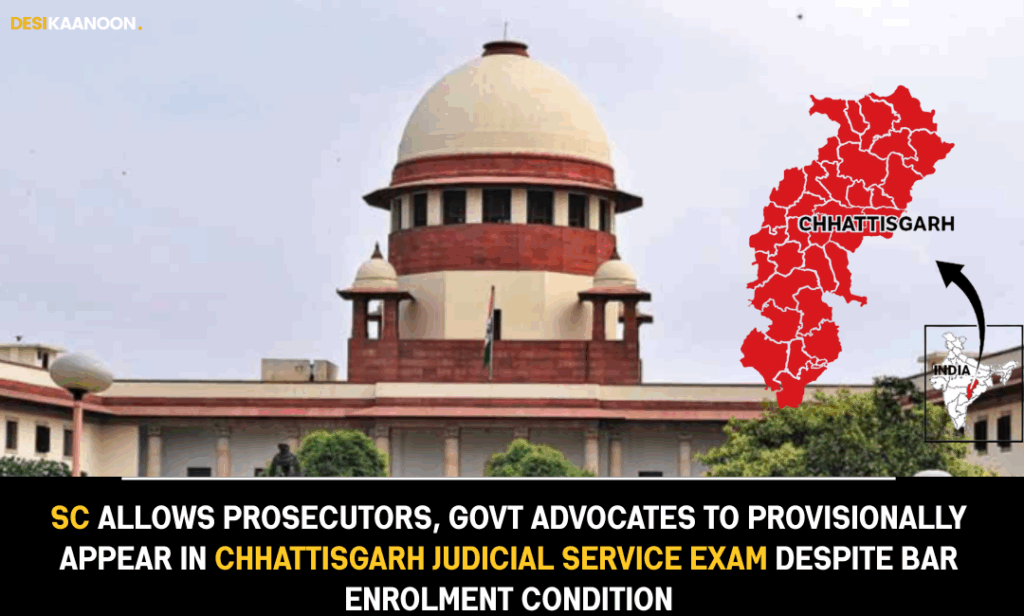Shreya Gupta
On 19th September, 2025, the Supreme Court passed an interim order allowing certain petitioners, who are working as Public Prosecutors and Government Advocates, to provisionally appear for the Preliminary Examination of the Chhattisgarh Judicial Service for the post of Civil Judge (Junior Division), scheduled to be held on Sunday.
The Court directed the Chhattisgarh Public Service Commission (CGPSC) to permit such petitioners, provided they possess the requisite qualifications, without insisting on the condition that they remain enrolled as Advocates as on the date of advertisement. shorten
The order came in response to the petitioners’ grievance that they had not been issued admit cards since the examination notification required candidates to be Advocates enrolled with the State Bar Council on the date of advertisement. As per the rules, persons appointed as Public Prosecutors or Government Advocates are required to suspend their enrolment, which led to their exclusion from the admit card.
The petitioners, after being denied relief by the Chhattisgarh High Court, approached the Supreme Court. A Bench of Chief Justice of India BR Gavai, Justice K Vinod Chandran, and Justice NV Anjaria issued notice on the Special Leave Petitions and clarified that the petitioners’ appearance in the exam would not create any equities in their favour. The Court also directed the CGPSC not to insist on the condition of three years’ practice since the notification for the exam had been issued before the judgment mandating the same was delivered.
During the hearing, the Court questioned whether law graduates employed as Government Servants, who had never enrolled as Advocates, could also be permitted to appear. The CJI orally distinguished between candidates who were once enrolled, later became Government Counsel, and suspended their licenses, and those who never enrolled and directly entered government service, noting that the two categories stand on a different footing.
Senior Advocate Uttara Babbar, appearing for some of the petitioners, argued that the interim order runs contrary to the Supreme Court’s earlier ruling in Deepak Aggarwal v. Keshav Kaushik, which had held that Public Prosecutors, Law Officers, and Government Lawyers are to be considered as Advocates. On September 16, the Chhattisgarh High Court had refused to interfere with the CGPSC’s decision not to issue admit cards to candidates working as Assistant Public Prosecutors, whose enrolment was suspended at the time of the recruitment advertisement dated 23.12.2024. Senior Advocates Vipin Sanghi and Uttara Babbar represented the petitioners with the assistance of AOR Prakhar Srivastava.
The background of the dispute lay in the substitution of Rule 7(1)(c) of the Chhattisgarh Lower Judicial Service (Recruitment and Conditions of Service) Rules, 2006, by a Gazette Notification dated 05.07.2024. The amendment required candidates not only to hold a law degree but also to be enrolled as Advocates under the Advocates Act, 1961. The official notification issued on 23.12.2024 for Civil Judge (Junior Division) recruitment followed this rule, which was challenged by the petitioners as being overly restrictive. On 22.01.2025, the High Court, as an interim measure, directed the CGPSC to permit candidates to apply even without Bar enrolment and ordered a corrigendum, which was issued on 23.01.2025, extending the deadline for non-enrolled candidates till 23.02.2025. The examination, initially scheduled for 18th May, 2025, was postponed awaiting the Supreme Court’s verdict in the All India Judges Association v. Union of India case.
The Supreme Court delivered its judgment in the AIJA case on May 20, 2025, mandating a minimum of three years’ practice as an Advocate for eligibility to Judicial Service. However, it clarified in para 90 that recruitment processes already underway must proceed as per the rules applicable on the date of advertisement. Despite this, the CGPSC denied admit cards to candidates not enrolled with the Bar on 23.12.2024, issuing them only to enrolled candidates on 11.09.2025.
Aggrieved, the petitioners approached the High Court, which on September 16 dismissed their pleas, holding that the CGPSC’s action was not arbitrary. It was against this backdrop that the Supreme Court intervened and passed the interim order permitting provisional participation of the petitioners in the examination.
Case Title: URWASHI KOUR AND ORS. V. THE STATE OF CHHATTISGARH
Case Number: Diary No. 53495/2025
Bench: Chief Justice of India BR Gavai, Justice K Vinod Chandran, and Justice NV Anjaria
Click here to access the order
Instagram: Click here
LinkedIn: Click here
For Collaboration and Business:info.desikaanoon@gmail.com

